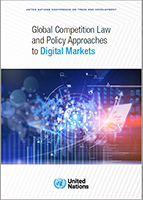
In the 21st century, the world has witnessed an unprecedented transformation driven by the rapid development of the digital economy. Digital platforms have contributed to technological developments and given rise to a number of new business models and novel products and services.
This report examines enforcement cases, emerging legislation, soft law approaches including guidelines and market studies cases targeted at digital platforms from around the world for the benefit of policy-makers and competition authorities responsible for monitoring and, where necessary, addressing the changes the digital economy is bringing to the competitive landscape. It is intended to inform them of the policy options being implemented and considered, and the existing tools being leveraged, by their counterparts around the world. This includes understanding the different policy drivers that could explain any differences in approach.
This paper is based on desktop research by the UNCTAD secretariat to identify different enforcement, legislative and soft law initiatives that have been taken in UNCTAD member States around the world in order to respond to competition issues associated with digital platforms. The aim was to examine measures taken by member States at varying levels of economic development (including from the global south) and different geographic regions. However, it does not purport to be a complete account of all initiatives that member States have taken in this area.
This paper also focuses on measures that are explicitly targeted at competition issues associated with digital platforms. UNCTAD recognizes that several other measures not discussed in this paper may also affect the impact that digital platforms have on competition, such as general law reform associated with merger control and the control and misuse of market power.
This paper aims to identify some of the different approaches being taken by competition authorities and policymakers globally for the benefit of those who are still considering their options on how to proceed. It begins by discussing the general policy considerations that appear to drive policy-makers and competition authorities when assessing the impact of digital platforms on competition and considering how to respond to those impacts. That discussion introduces some of the measures that have commonly been used to introduce those concerns, observing that there does not to be a clear consensus on the extent to which action should be taken to manage the competitive impacts of digital platforms, or what any action of this type should look like.
The paper then goes on to provide a more detailed account of specific measures and initiatives that member States have taken, beginning with enforcement actions and the use of merger control regimes under existing competition law frameworks.
The final section of the paper explores how international cooperation can improve and advance responses to those concerns and the potential role of UNCTAD in facilitating that cooperation. As legislative and soft law initiatives discussed have only recently been implemented or are still works in progress, it is still too early to assess their effectiveness in responding to dynamic and rapidly changing digital markets. Even so, understanding the different approaches being taken in a range of jurisdictions can serve as a basis for building an international consensus on how to best respond to competition concerns in digital markets in the future.




